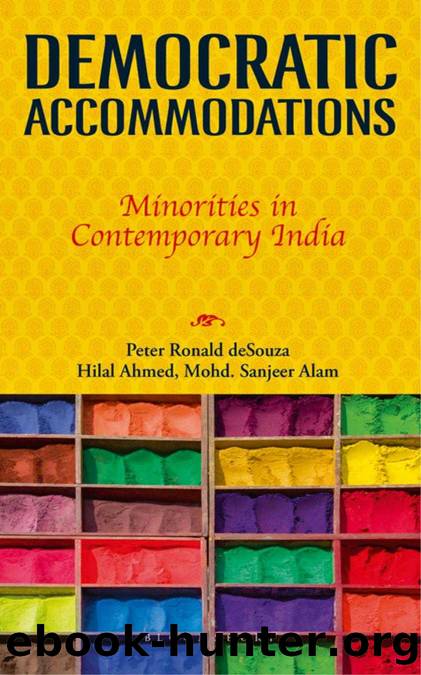Democratic Accommodations by unknow

Author:unknow
Language: eng
Format: epub
ISBN: 9789388414562
Publisher: Bloomsbury Publishing
Published: 2019-08-18T07:00:00+00:00
While renaming streets/roads in 1950s was used as an ideological tool to divest landscapes of their colonial association and acquire political legitimation, a new trend seems to have set in with the rise of cultural nationalists in political power in recent years. Renaming of streets, roads and places is now being used to polarise socioreligious communities for electoral advantage. The most visible pattern is picking up streets/roads/places bearing association with medieval periodâoften seen by the cultural nationalists as a period of political and cultural ruptureâand renaming them.
The most controversial case in this context is renaming Aurangzeb Road in 2015 after A.P.J. Abdul Kalamâone of the most popular former Presidents of India. This particular instance of renaming or relabelling of one of the most important roads of Central Delhi is of enormous symbolic and political significance. For one thing, Aurangzeb, one of the most powerful Moghul rulers, is seen by many, mostly the Hindu right as the symbol of âIslamic fanaticismâ and âdespotismâ. On the other hand, A.P.J. Abdul Kalam, though a devout Muslim himself, is hailed as a kind and benevolent human being and above all an illustrious son of the soil who, through his momentous contribution in Indiaâs defence sector was described as the âmissile manâ and added to the strength and pride of the country. In a way, relabelling Aurangzeb Road after A.P.J. Abdul Kalam is not only an attempt of further excoriating Aurangzeb but also of playing the politics of âGood Muslim/Bad Muslimâ.
This is, however, not an isolated case but rather confirms a pattern. For instance, a 150-year-old railway station named âMughal Saraiâ (in the state of Uttar Pradesh) has recently been renamed as âPt. Deen Dayal Upadhyaya Junctionâ after the Jan Sangh (the precursor to the BJP) leader Deen Dayal Upadhyaya. The city of Allahabad named by Akbar (who, unlike Aurangzeb, is hailed as a benevolent and secular Moghul king) has been renamed as Prayagraj. Even the famous Hazratganj Crossing in Lucknow, named after Begum Hazrat Mahal, a heroic Avadh queen who fought the British, has been declared to be renamed as âAtal Chowkââafter one of the founding members of the BJP and the former Prime Minister of India. What is, however, more worrisome is that all this did not arouse strong enough public outcry so as to stop governmentâs renaming spree. There is a little realisation that renaming places, streets or roads creates ruptures in peopleâs lived experience. It is also like demolishing monuments. Once erased, they fade from public memory and consciousness.
Educational Policies
In modern times, the education system of a country is not merely a site of production and transmission of knowledge and of socio-economically useful skills but also one of the primary agencies of socialisation. It is in educational institutions, schools in particular, that the children learn about and develop attitudes towards the nation, the society and the outside world. Generally speaking, education systems seek to transmit the dominant value system to the next generation. This is hardly an issue in homogeneous societies (Watson, 1979).
Download
This site does not store any files on its server. We only index and link to content provided by other sites. Please contact the content providers to delete copyright contents if any and email us, we'll remove relevant links or contents immediately.
Spare by Prince Harry The Duke of Sussex(5200)
Machine Learning at Scale with H2O by Gregory Keys | David Whiting(4314)
Fairy Tale by Stephen King(3401)
Will by Will Smith(2928)
The Bullet Journal Method by Ryder Carroll(2575)
Hooked: A Dark, Contemporary Romance (Never After Series) by Emily McIntire(2561)
It Starts With Us (It Ends with Us #2) by Colleen Hoover(2370)
Rationality by Steven Pinker(2368)
Can't Hurt Me: Master Your Mind and Defy the Odds - Clean Edition by David Goggins(2344)
Friends, Lovers, and the Big Terrible Thing by Matthew Perry(2234)
The Becoming by Nora Roberts(2207)
Love on the Brain by Ali Hazelwood(2080)
A Short History of War by Jeremy Black(1851)
The Strength In Our Scars by Bianca Sparacino(1847)
HBR's 10 Must Reads 2022 by Harvard Business Review(1847)
A Game of Thrones (The Illustrated Edition) by George R. R. Martin(1751)
Leviathan Falls (The Expanse Book 9) by James S. A. Corey(1747)
515945210 by Unknown(1669)
Bewilderment by Richard Powers(1623)
